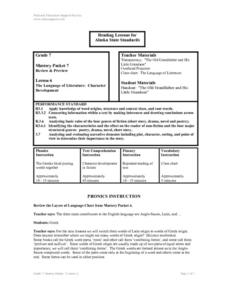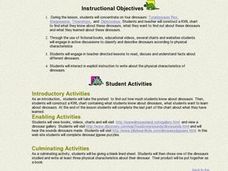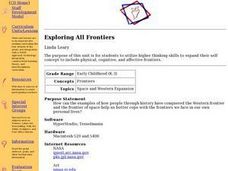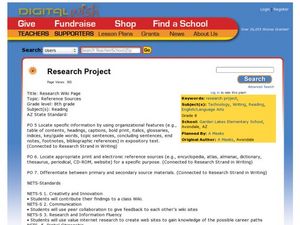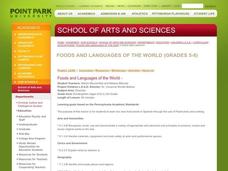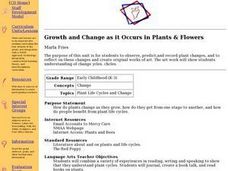Curated OER
Analyzing Textbook Formats
Students explore the characteristics of a non-fiction text. For this comprehension lesson, students are led on a guided tour of each text and identify the features of a non-fiction text. Students continue to practice locating features...
Curated OER
Greek Origins and Character Development
Seventh graders examine words of Greek origin and discuss character development in fiction. They read a list of Greek word parts and create words on a worksheet. Students then read and discuss an informational handout about character...
Curated OER
Go For The Gold!
Third graders read fiction and nonfiction works for comprehension. Using the internet, 3rd graders participate in a WebQuest. They compare and contrast the Olympics in ancient Greece to the modern day Olympics. Afterwards, students...
Curated OER
"Julie of the Wolves"
Fifth graders research life in Alaska and compare life there to their lives in this lesson. They read "Julie of the Wolves." They research through the novel and other reference books facts about the Alaskan climate and geography. They...
Curated OER
African Savanna
First graders are introduced to the ecosystems of savannas throughout the world. Using new vocabulary, they identify and describe the characteristics of a savanna and the animals that live there. They also describe the Earth's physical...
Curated OER
Batter Up
Students explore personal achievement by reading a children's book. In this story analysis lesson, students read the book Batter Up, by Sue Muller Hacking and discuss the main character in the story and the actions that she takes to meet...
Curated OER
Dinosaurs - Physical Characteristics
Pupils describe the physical characteristics of dinosaurs, compare and contrast the evolution of land, and they explore the extinction of dinosaurs.
Curated OER
Would You Like to Become a Millionaire?
Young scholars answer questions written by other teams about literature in an attempt to become "millionaires." In small groups they write a motivational introduction to their teams selected books, publish their questions as a HyperCard...
Curated OER
Ecosystem Energizers
Fourth graders see how the flow of energy through an ecosystem made up of producers, consumers, and decomposers carries out the processes of life and that some energy dissipates as heat and is not recycled.
Curated OER
In Country: An Integrated Look at the Vietnam War
Young scholars explore aspects of the Vietnam War and how it relates to the heritage of America. In an attempt to understand the level of involvement, students analyze statistics from the Vietnam war. Young scholars watch a video, read a...
Curated OER
Life Cycle of a Butterfly/ Moth
Students explore the life cycle of butterflies, illustrate the life cycle of the butterfly, and compare the researched facts to stories written by Eric Carle about caterpillars and butterflies.
Curated OER
Exploring All Frontiers
Young scholars utilize higher thinking skills to expand their self concept to include physical, cognitive, and affective frontiers. The teacher create activities which allow students to use raw data and primary sources, as well as...
Curated OER
Research Project
Students learn the characteristics of arachnids by researching the arachnid of their choice and producing a 4 to 5 paragraph research paper.
Curated OER
Planets Online
Students use bookmarked Internet web sites about Space to gather information and use desktop publishing software to write assignments. They participate in various web assignments on provided links to study the planets and the solar system.
Curated OER
Africanized Honey Bees And Society
Students investigate how information is disseminated about honey bees and other insects. They make a list of key words and phrases, or even write a brief summary of their impressions of insects and their relatives after viewing the movie.
Curated OER
Predator-Prey Relationships
Learners understand ecological systems. They provide experiences to assist citizens to increase their sensitivity and stewardship for the environment.
Curated OER
Predator-Prey Relationships
Students explore the interrelatedness of predators and prey in four different activities. They simulate an aquatic insect, fish, and osprey food chain during a poker chip game, play an M&M game to simulate the relationship between...
Curated OER
Time for All Ages
Fourth graders discover time keeping by analyzing technological advances in history. In this time lesson, 4th graders create and complete a KWL chart based on their research of a famous timekeeping invention, such as a sundial....
Curated OER
Foods and Languages of the World
Young scholars review Mexico's location and language and learn to pronouns 10 new Spanish food words. Students listen as the book, Corn is Maize is read, touching and passing around an ear of Indian corn. Young scholars discuss the...
Alabama Learning Exchange
Going Batty
Second graders participate in a research project involving bats. They collect information for their project on the Internet and other educational sites. They participate in a field trip to discover more about bats at the zoo.
Curated OER
Diversity of Life
Students compare the different classifications and explore how organisms are grouped. In this classification lesson students study images of organisms and answer questions.
Curated OER
Jack and the Beanstalk
Third graders examine a reading selection. In this fairy tale lesson, 3rd graders read Jack and the Beanstalk. Students are divided into groups and each group lists the elements of a fairy tale and writes a script for a puppet play of...
Curated OER
Growth and Change as it Occurs in Plants and Flowers
Students work together to observe plants and flowers through their life cycle. In groups, they make predictions and record changes in a journal. Using this information, they create their own original artwork and discuss the plants life...
Curated OER
All About Me-I'm My Own Research Project
Third graders see how to do a research project. They understnad how to categorize information about themselves and relate it to information on sea animals for a future research project. This lesson fits in nicely with any unit on animals.

